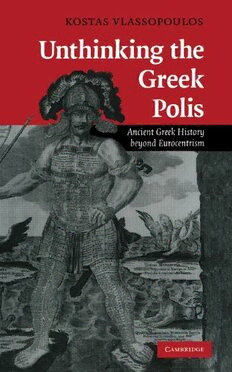
Unthinking the Greek Polis: Ancient Greek History beyond Eurocentrism PDF
304 Pages·2007·2.191 MB·English
Most books are stored in the elastic cloud where traffic is expensive. For this reason, we have a limit on daily download.
Preview Unthinking the Greek Polis: Ancient Greek History beyond Eurocentrism
Description:
This study explores how modern scholars came to write Greek history from a Eurocentric perspective and challenges orthodox readings of Greek history as part of the history of the West. Since the Greeks lacked a national state or a unified society, economy or culture, the polis has helped to create a homogenizing national narrative. This book re-examines old polarities such as those between the Greek poleis and Eastern monarchies, or between the ancient consumer and the modern producer city, in order to show the fallacies of standard approaches. It argues for the relevance of Aristotle's concept of the polis, which is interpreted in a novel way. Finally, it proposes an alternative way of looking at Greek history as part of a Mediterranean world-system. This interdisciplinary study engages with modern debates on globalization, nationalism, Orientalism and history writing, while also debating recent developments in classical studies.
See more
The list of books you might like
Most books are stored in the elastic cloud where traffic is expensive. For this reason, we have a limit on daily download.
